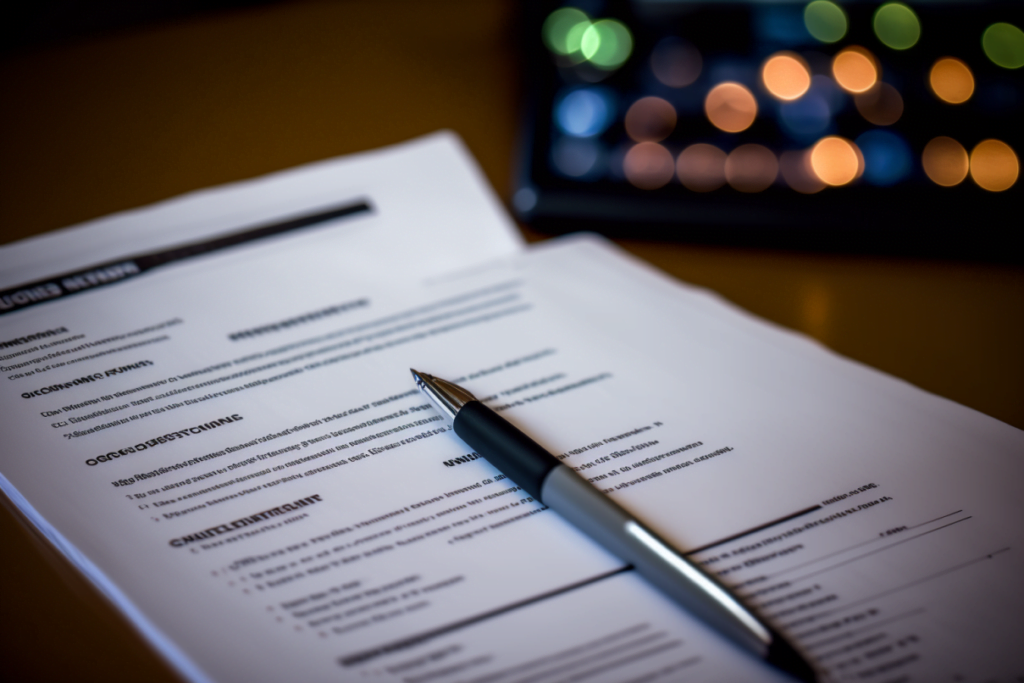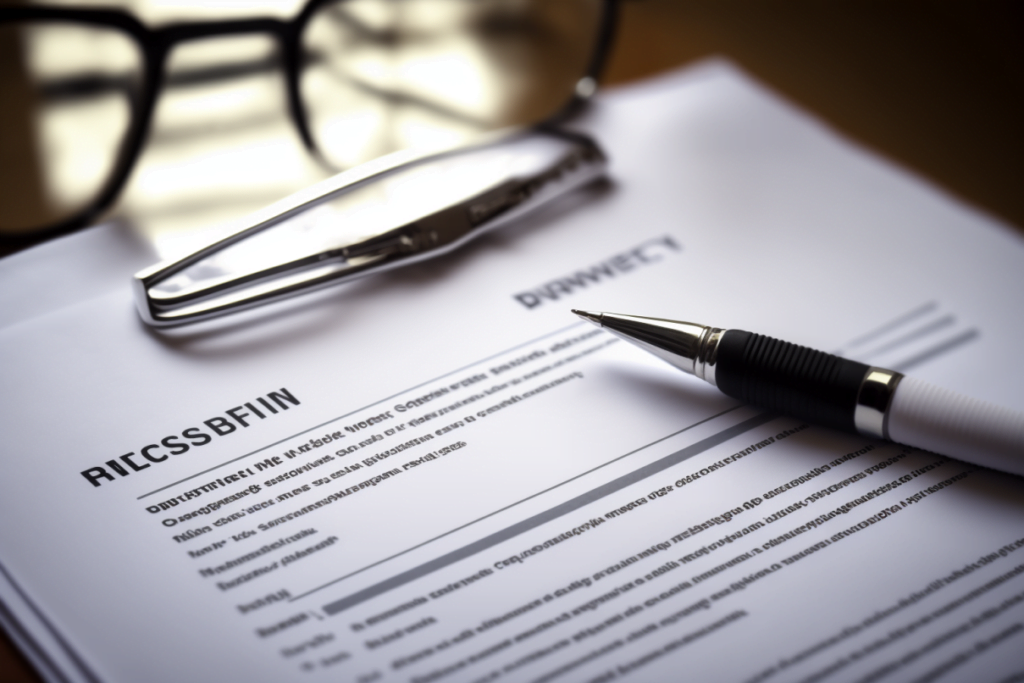How to Prevent Resume Plagiarism and Get an Executive Job
In today’s competitive job market, some job seekers may ask themselves; can you plagiarize a resume. But here’s the truth: resume plagiarism is unethical and can harm your job search prospects, leading to rejection, tarnish your reputation, and even the end of your career.
So, how can you avoid the nefarious side of resume plagiarism and create an original document that highlights your talents?

Why Is Plagiarism a No-No?
Plagiarism is a kind of intellectual theft that demonstrates a lack of integrity, inventiveness, and professionalism. Companies want job applicants to be accurate and authentic in their job applications. By plagiarizing, you risk harming your reputation and losing the confidence of future employers.
Moreover, recruiters and hiring managers utilize software programs to analyze resumes and cover letters for keywords and particular criteria; if they find stolen material, they will most likely deny your application or, worse, blacklist you from future employment possibilities.
How Can You Make a Unique Resume?
Now that we’ve demonstrated the consequences of resume plagiarism, let’s look at how to produce a distinctive and compelling resume.
Here are some pointers to keep in mind:
Tailor your resume to the position you’re looking for: Utilize keywords and phrases from the job description to indicate that you fulfill the qualifications, but don’t copy and paste; instead, rewrite it with your own spin.
Emphasize your accomplishments and skills: Utilize bullet points to highlight your successes and how you provided value to past jobs, and be precise and quantify your influence whenever feasible.
Concentrate on your unique selling proposition: What distinguishes you from other job candidates? Is it your industry knowledge, leadership capabilities, or problem-solving abilities? Emphasize these traits in your CV to create a lasting impression.
Be genuine and honest: Don’t inflate your talents or expertise to look more qualified; instead, be open about your abilities to prevent getting caught in a falsehood.
How Can You Tell Whether Your CV Is Plagiarized?
These are some precautions you may take to prevent plagiarism in your resume:
Employ plagiarism checkers: Tools like as Grammarly and Turnitin may help you discover copied information in your resume, but don’t depend completely on them; use your own discretion to guarantee your resume is unique.
Although resume templates may be useful, they can sometimes restrict your originality and lead to unintended copying. Instead, create your resume from scratch in a basic and clear structure.
Proofread your resume:
Typos and grammatical issues might hurt your job search chances, so be sure to reread it many times.
In conclusion, resume plagiarism is a risky and unethical practice that can harm your job search prospects. By following the tips in this article, you can create an original and compelling resume that highlights your talents and qualifications. Remember, honesty and authenticity are essential for a successful job search.
The Dangers of Replicating Job Descriptions on Your Resume
As a job seeker, you want to promote yourself as the best candidate for the job you’re looking for, and one method to do so is to copy job descriptions or skill sets from the hiring company’s website onto your resume. But, this is a hazardous approach that might backfire.
Is Copy-and-Paste Beneficial to the Candidate? Copying and pasting may appear to be a quick and easy way to impress the hiring company, but it is not a wise move. Using this approach can create the illusion that you have the exact set of skills required for the position, but it is only a mirage. When it comes to interviews, you will most likely be caught off guard and exposed as an imposter.
Should Resumes Utilize a Plagiarism Checker?
Using a plagiarism checker can be a useful tool to detect any copied content on your resume. However, it’s important to use your own discretion and ensure that your resume is unique and authentic. Don’t rely solely on a tool, but instead, take the time to review and revise your resume to showcase your true abilities and accomplishments.
Checking Resumes for Plagiarism
Checking resumes for plagiarism is a smart way to detect dishonest candidates who are unqualified for the position. Plagiarism detecting software can easily identify applicants who copy-paste content from other sources. If a company values hiring the right person, using plagiarism checks for final round candidates is a wise decision.
The Importance of Authenticity and Honesty
Plagiarism is a red flag that indicates the candidate is dishonest and lacks the necessary skills for the job, as well as a clear indication that they are willing to lie to the company to get the job. When plagiarism is detected, it eliminates candidates who are not authentic and truthful in their job application.
Social Media Security
Another place where job seekers may be tempted to copy and paste information is social media sites such as LinkedIn. However, copying and pasting information from another profile is unethical and unprofessional. Instead, create an original profile that accurately represents your skills and experiences.
In conclusion, copying job descriptions or skill sets onto your resume is a risky move that can harm your job search prospects. Instead, create an original and authentic document that highlights your unique skills and experiences. Using plagiarism checks for final round candidates is a wise decision for companies that value the importance of hiring the right person for the job.
The Ethical Implications of Copying Accounts on Social Media Sites

LinkedIn and other social networking platforms provide a convenient method to promote your abilities and expertise to prospective employers; but, same ease may also make it easy for others to steal your profile information; this activity is unethical and can impair your job search chances. Copying profile information is considered plagiarism. Plagiarism is not flattery; it is intellectual theft that may harm your career. Taking material from someone else’s profile or having your profile information duplicated is improper; it is a type of plagiarism that can undermine your reputation and make it look as if you lack originality.
Updating Your Profile Is Necessary, Yet It Is Not Enough
Keeping your profiles up to date is critical to attracting the attention of potential employers. However, if someone copies your information or if you copy someone else’s information, it can cause confusion. When both profiles appear in the search, it will appear as if both profiles are the same. As a result, the hiring professional may disregard both candidates, assuming that they are dishonest.
What Should You Do If Someone Steals Your Profile?
There are steps you can take if you suspect someone has copied your profile.
Social Media Profile Ethics and Intellectual Property
Although social media sites provide an excellent platform for showcasing your skills and attracting potential employers, copying profiles is an unethical practice that can harm your job search prospects. This article discusses the importance of originality and intellectual property on social media sites, as well as tips for protecting your information.
Protecting Your Intellectual Property
Begin by performing regular searches with quoted keywords from your profile to see if any other results appear. If you find results that are not your own, it’s likely that someone has taken your information and posted it to their profile. In this case, it’s critical to contact the person who copied your profile information and request that they delete the material. Be forceful and aggressive in your conversation. If they don’t answer or refuse to remove the information, report them to the site’s administrators.
Conclusion
In conclusion, copying profile information on social media sites is unethical and can harm your job search prospects. It is critical to create an original and authentic profile that accurately represents your skills and experience. If you suspect that someone has copied your information, take immediate action to protect your intellectual property.
The LinkedIn Ethics of Dealing with Plagiarism
LinkedIn is a terrific platform for showing your abilities and expertise to prospective employers; but, the site’s simplicity may make it simple for others to steal your profile material, which is a type of plagiarism that can restrict your possibilities and harm your reputation.
Using LinkedIn to Call Out Plagiarism
If you discover that someone has copied your LinkedIn profile information, you should take action. A phone call is a more personal approach that is harder to ignore than an email. Begin by introducing yourself and stating that you’ve noticed similarities between their profile and your own. Be firm but respectful in your tone and ask them to remove the copied information. The issue is resolved if the person responds positively and removes the information; however, if they refuse to remove the information or do not respond, you can flag/report their profile to alert the site’s authorities; if the issue persists, you can contact the site’s tech support for further assistance.
The Implications of Plagiarism on LinkedIn
Plagiarism on LinkedIn is not only unethical; it can also limit the number of contacts and job opportunities available to the original owner of the information.
Creating a One-of-a-Kind Resume
Using someone else’s resume as your own is not a good idea because there will be differences in experience and achievements. Additionally, if you’re copying someone else’s resume, chances are that others are doing the same thing, which can lead to identical resumes being submitted for the same position.
Managing Plagiarism on LinkedIn: How to Safeguard Your Intellectual Property
LinkedIn is a popular job-search platform, but it is not immune to plagiarism. This article explores the ethical implications of plagiarism on LinkedIn and provides tips for dealing with this issue. It is critical to protect your intellectual property and maintain the integrity of your profile in order to increase your job search prospects.
Summary: Protecting Your Profile on LinkedIn
When someone copies your information, it creates a victim with few options for regaining their strength, which is why it is critical to take action and protect your intellectual property. To summarize, plagiarism on LinkedIn is a serious issue that can harm your job search prospects. It is critical to create an original and authentic profile that accurately represents your skills and experience. If you discover that someone has copied your profile information, take immediate action by calling them out or flagging/reporting their profile.
The Importance of Developing a Standout Resume

Creating a Standout Resume
There are guidelines for writing proper resumes, and professional resume writers can be helpful, but it’s important to ensure that the information in the document is unique to you. Generic information and bland words will not make you stand out on the page, so focus on finding a way to represent yourself in a way that showcases your skills and experience.
Keep in mind that if you simply write about your work description, the mix of careers, experiences, and words to express that information is restricted, which is why it’s crucial to go outside the box and discover innovative methods to highlight your unique experiences and accomplishments.
In conclusion, your resume is an important part of your job search. It’s critical to create a document that’s unique to you and highlights your skills and experiences. While there are guidelines for crafting proper resumes, it’s critical to find ways to stand out from the crowd. Remember, the goal is to represent yourself in a way that highlights your unique abilities and experiences.
Crafting an Original and Personalized Resume
Highlighting Your Special Achievements in Your Resume
As an executive resume writer, it is critical to capture the specifics of your outstanding achievements so that no one can claim your unique history and you have plenty of discussion material for your interview to prove your expertise. To avoid plagiarism, it is important to focus on your own achievements and not copy those of others.
Showcasing Your Distinctive Experience
Focus on highlighting your unique experience and accomplishments to make your resume stand out. This can include specific projects you’ve worked on, results you’ve achieved, and skills that are not commonly found in your field. By focusing on these unique details, you can create a document that sets you apart from other candidates.
Your resume is the first impression you make on a potential employer, so it’s critical to create a document that’s unique to you. A well-crafted and personalized resume can help you stand out from the competition and increase your job search prospects. Remember to focus on highlighting your special achievements and distinctive experience to create a document that sets you apart from other candidates.
Making an Eye-Catching Executive Resume

Highlighting Your Special Achievements in Your Resume
As an executive, it’s crucial to capture the specifics of your outstanding accomplishments, so no one can claim your unique history. When creating your resume, focus on highlighting your unique experience and accomplishments to make your resume stand out. This can include specific projects you’ve worked on, results you’ve achieved, and skills that are not commonly found in your field.
Looking for Novel Ways to Communicate Your Experience
You can use research to find unique ways to represent your experience in your resume. This includes looking at industry-specific keywords, job descriptions, and company profiles to identify the skills and experience that are in high demand. You can also hire professional resume writers to help you craft a document that is tailored to your specific skills and experience.
To summarize, creating a unique and personalized executive resume is critical to standing out in the job market. By highlighting your special achievements and researching industry-specific keywords, you can create a document that showcases your expertise and sets you apart from other candidates.
FAQ
Q: Why is copying profile information on social media unethical?
A: Copying profile information on social media is unethical because it can harm the original owner’s job search prospects and is a violation of their intellectual property rights.
Q: How can you protect your intellectual property on social media?
A: One way to protect your intellectual property on social media is to perform regular searches with quoted keywords from your profile to see if any other results appear. If you find results that are not your own, contact the person who copied your profile information and request that they delete the material. If they refuse, report them to the site’s administrators.
Q: What is plagiarism on LinkedIn?
A: Plagiarism on LinkedIn is when someone copies your profile material without your permission and posts it as their own.
Q: How can you deal with plagiarism on LinkedIn?
A: If you discover that someone has copied your LinkedIn profile information, you can call them out or flag/report their profile. If the issue persists, you can contact the site’s tech support for further assistance.
Q: Why is it important to create a unique and personalized resume?
A: It is important to create a unique and personalized resume because it helps you stand out from other candidates and increases your job search prospects. A well-crafted and personalized resume can also highlight your unique skills and experiences.
Q: How can you highlight your special achievements and distinctive experience in your resume?
A: You can highlight your special achievements and distinctive experience in your resume by focusing on specific projects you’ve worked on, results you’ve achieved, and skills that are not commonly found in your field. You can also research industry-specific keywords, job descriptions, and company profiles to identify the skills and experience that are in high demand.